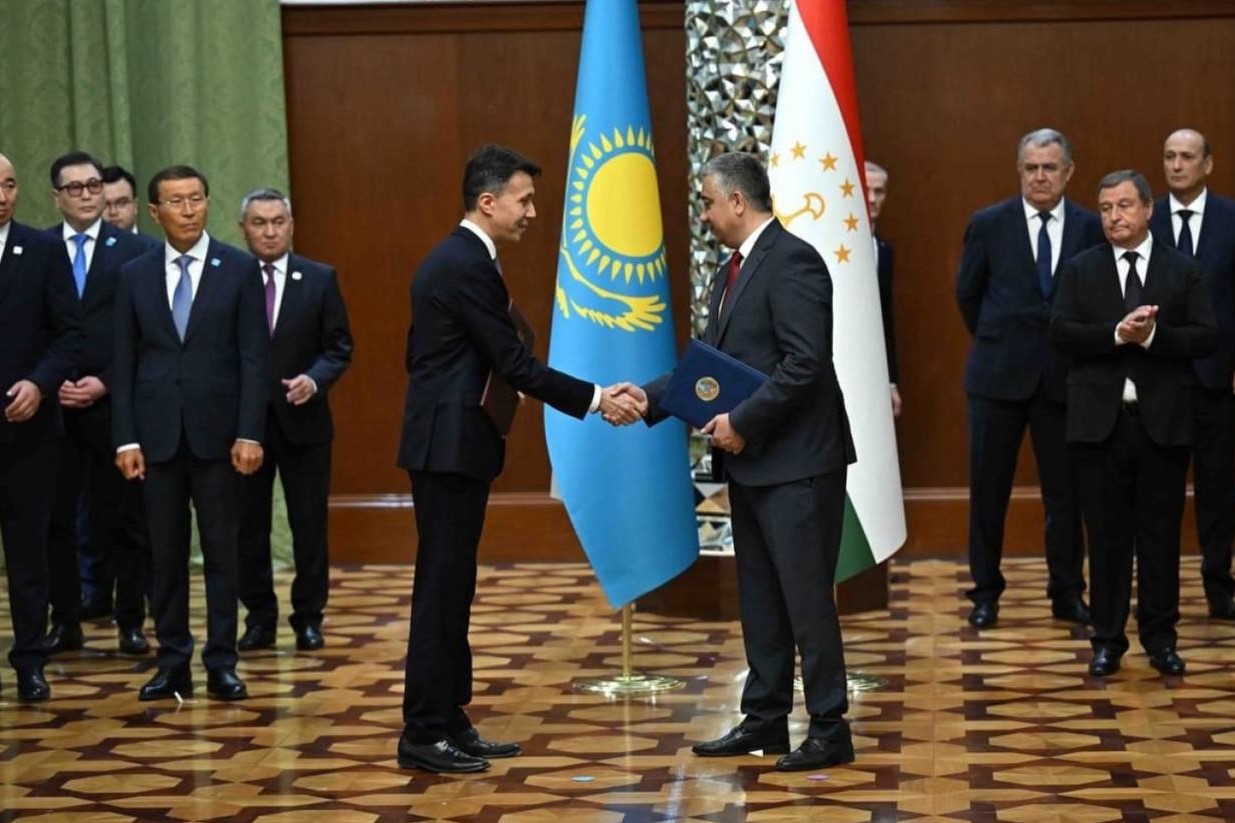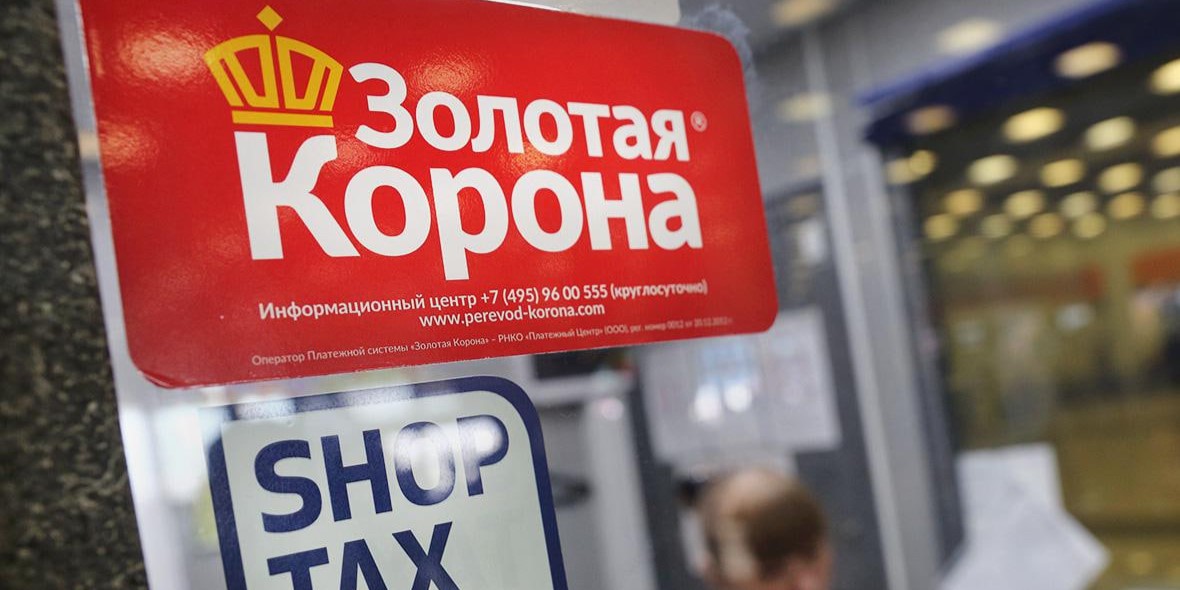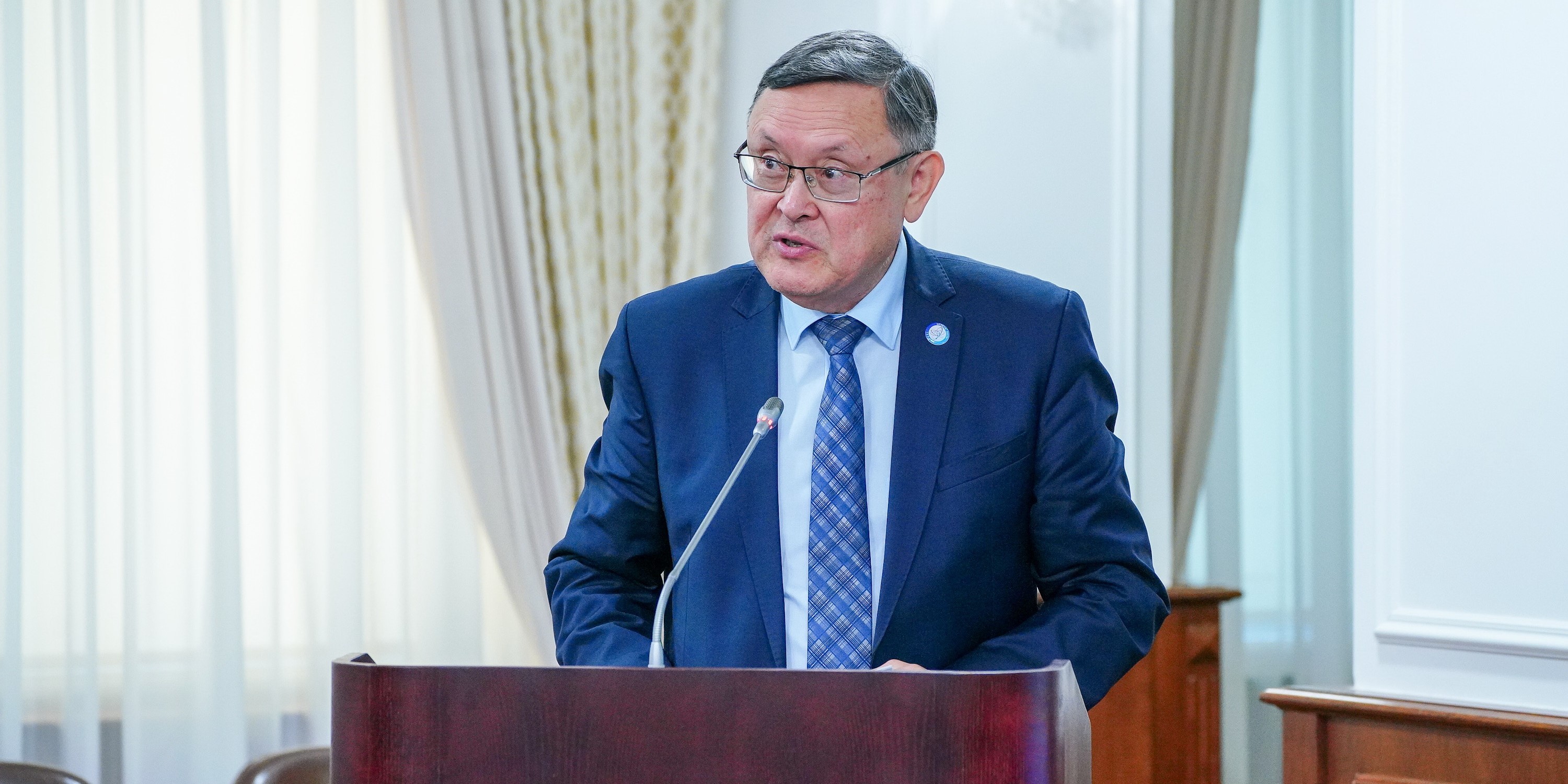Over the past week, the media in the region has been discussing Kazakhstan’s aim to construct a nuclear power plant and the government’s plan to hold a referendum on the matter this autumn. They have also been discussing the various plans to expand the Trans-Caspian International Trade Route (TITR), as well as the meeting of the German-Kazakh Business Council. Several sources also elaborated on the agreements concluded during the Kazakhstani President’s state visit to Tajikistan last week. Many outlets also mentioned the sanctions against the “Zolotaya Korona” payment system and other Russian banks. They also outlined Kaspi’s attempts to buy the Uzbekistani state’s share in the Humo payment system.

CEOs of KazAtomProm and Tajik Rare Metals sign MoU on uranium and rare minerals exploration. Source: Daryo
Trade
The 15th German-Kazakh Business Council on Strategic Cooperation was held in Berlin on August 28 (Kazakhstan Today). During the council meeting, Germany and Kazakhstan signed 10 different agreements, including a framework agreement on investment cooperation, a memorandum of understanding between the Saarbrucken Chamber of Commerce and the Kazakh Invest national company, an agreement on the construction of the Flight Design Kazakhstan plant, as well as several other memorandums of understanding between Kazakhstani and German companies (The Astana Times). Germany is Kazakhstan’s largest trading partner in the EU and 752 enterprises operate in Kazakhstan with the help of German investments. Most German investments are concentrated in the construction, processing, chemical, and transportation industries. These new agreements come amid significant German interest and investment in developing the Trans-Caspian International Trade Route (TITR) (The Astana Times), as well as Chancellor Olaf Scholz’s upcoming visit to Astana in September (Kazinform).
Kazakhstan aims to increase the capacity of the TITR to 10 million tons annually by implementing the roadmap to eliminate bottlenecks and develop the Trans-Caspian International Transport Route by 2027 (The Astana Times). To this end, Kazakhstan has concluded several agreements with China on establishing China-Europe container trains. A joint venture between the railways of Georgia, Azerbaijan, and Kazakhstan, Middle Corridor Multimodal, was created to ensure the efficient operation of the route. Traffic along the route has grown steadily over the past years. In 2023, volumes along the route increased by 65% to 2.76 million tons, and in the first seven months of 2024, volumes increased to 2.65 million tons, an increase of 63% compared to the same period last year (Kazinform). These developments come after recent reports on Kazakhstan’s efforts to expand its merchant fleet and ports on the Caspian Sea. Currently, Kazakhstan plans to construct seven new vessels. Last year, KazMunayGas and Abu Dhabi Ports Group agreed to open a shipbuilding yard in Kazakhstan. Efforts are also underway to build new container terminals at Aktau and Kuryk ports. Kazakhstan has also introduced the “Digital Trade Corridor” system to expedite customs declarations.
During Kazakhstan President Kassym-Jomart Tokayev’s recent state visit to Tajikistan, Tajik Rare Metals and Kazatomprom signed a memorandum of understanding concerning the joint exploration, mining, and processing of uranium and other rare minerals (Asia-Plus). The agreement focuses on research and development as well as personnel training. Later this month, a delegation from Tajik Rare Metals will visit Kazakhstan to examine the production capabilities of Kazatomprom, one of the largest producers of uranium in the world. The Ministry of Digital Development, Innovation and Aerospace Industry of Kazakhstan, the Agency for Innovation and Digital Technologies of Tajikistan, Amonatbonk, and Freedom Bank also inked several memorandums of understanding pertaining to digital infrastructure and innovation (Daryo). The agreements include establishing a significant technology park in Tajikistan to support new startups.
Elsewhere, it was reported that Kazakh Invest and Chinese company Xinjiang Hengyuan Investment Management signed a memorandum of understanding to construct a trade and industrial park in Astana. The construction of the park is expected to attract more Chinese investment to Kazakhstan (Kazakh Invest).
Finance
Several Kazakhstani banks have halted operations with Russia’s “Zolotaya Korona” payment system amid new U.S. sanctions (Kun). Specifically, Halyk Bank, Bank RBK, and Eurasian Bank have stopped processing payments “due to technical reasons.” However, other banks, such as Bereke Bank, CenterCredit, and Nurbank, have announced that they will continue to process payments made through the system. “Zolotaya Korona” is one of the principal payment systems used by Russians to withdraw cash abroad since they were excluded from the SWIFT, Mastercard, and Visa payment systems in 2022. On August 23, the U.S. Treasury imposed sanctions on the system’s developer “Centre for Financial Technologies.” Nevertheless, recent figures suggest that 87% of money transfers in Kazakhstan are made through “Zolotaya Korona.”

Several Kazakhstani banks have halted operations with the “Zolotaya Korona” payment system. Image: Kun.uz
These latest developments come after earlier reports about banks throughout the region halting the processing of payments made through Russian banks and payment systems. Earlier this year, several Kazakhstani banks also restricted transfers to Russia through Sberbank and T-Bank (Kursiv). This week, another Kyrgyzstani bank, MBank, also suspended money transfers through Russian banks (AKIpress).
The Kazakhstani fintech company Kaspi plans to acquire 100% of the Uzbekistani state’s share in the operator of the Humo payment system (Daryo). Humo is a widely used payment system in Uzbekistan, which facilitates payments through its extensive network of over 27 million HumoCards and 210000 terminals. The founder and CEO of Kaspi, Mikhail Lomtadze, noted Humo’s strong performance, with net profits surging by 88%, and the improving economic situation in Uzbekistan. Kaspi is a payment system and e-commerce provider in Kazakhstan that is well-known for its innovative and wide range of products and services. It has also made great strides internationally, including a successful IPO on the NASDAQ earlier this year.
Energy
Kazakhstan has advanced plans to build a nuclear power plant (NPP) amid continuing energy shortages and the country’s commitment to achieve carbon neutrality by 2026 (Daryo). At a recent government meeting, Timur Zhantikin, General Director of Kazakhstan Nuclear Power Plants, updated Prime Minister, Olzhas Bektenov, on the NPP project (Office of the PM of Kazakhstan). According to recent reporting, the plant will be built in Ulken in the Almaty region. Four potential contractors have also been shortlisted, including China’s CNNC, Russia’s Rosatom, France's EDF, and Korea’s KHNP. While the exact cost has not yet been determined, estimates range between $10 billion and $15 billion (Daryo). This week, the Kazakhstani government also passed a resolution to hold a referendum on NPP construction (Kazinform). Overall, the issue remains controversial in Kazakhstan, where the environment has been damaged by Soviet nuclear testing at Semipalatinsk.

General Director of Kazakhstan Atomic Power Plants JSC Timur Zhantikin talking about the organization of work on the construction of nuclear power plants during a Government session chaired by the PM. Image: PM's office
The project is viewed as increasingly necessary as Kazakhstan continues to struggle with electricity shortages. According to reports, Kazakhstan will continue to rely on electricity imports and, to this end, has sought to conclude agreements with neighboring states. In 2023, Tajikistan and Kazakhstan signed a memorandum of understanding to supply electricity from Tajikistan’s Rogun HPP to Kazakhstan using Uzbekistan’s electricity network (Kun). Kazakhstan's Minister of Energy, Almassadam Satkaliyev, recently held talks with Tajik government officials and both sides hope to finalize an agreement by October. However, last week, it was reported that the Rogun HPP project is running behind schedule and over budget. Currently, it is expected that the dam will be finished in 2035 at a cost of $6.4 billion (Daryo).
Gazprom has announced that gas supplies to Central Asia have doubled, according to Alexey Miller, the Chairman of the Management Committee of Gazprom (Kun). He added that gas supplies through the Central Asia – Centre pipeline have grown dramatically due to the increasing rates of economic growth and concomitant energy consumption in the region. He also noted that Uzbekistan remains the principal destination for Russian gas exports in Central Asia and that gasification in Kyrgyzstan has doubled in the past ten years.
Diplomatic Events
Kazakhstan’s Ministry of Foreign Affairs recognized a Taliban diplomat, Mohammad Rahman Rahmani, as the Chargé d'Affaires of the Afghan Embassy in Astana (Daryo). This recognition comes amid ongoing efforts by Kazakhstan to normalize relations with the Taliban administration in Afghanistan. Earlier this year, Kazakhstan also removed the Taliban from its list of terrorist organizations. This approach is broadly in line with regional developments, where other countries, such as Turkmenistan and Uzbekistan, have sought to engage with the Taliban.

